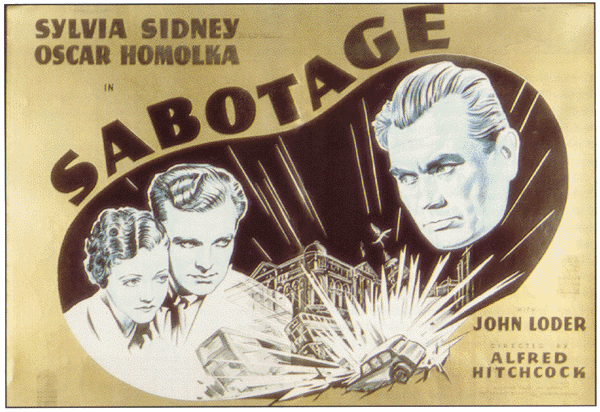Sabotage (1936)
 Thursday, December 27, 2012 at 9:09PM
Thursday, December 27, 2012 at 9:09PM 
Sabotage (1936)
In what would be his first foray into titles beginning with “Sabot” (he filmed the exciting Saboteur later), Hitchcock delves into his familiar world of espionage with a film based on the Joseph Conrad novel The Secret Agent (having made an eponymously titled movie previously, it couldn’t follow tout de suite). Still, based on plot along with the diegetic use of the word “Sabotage” throughout, nothing else feels appropriate.
Here The Master begins another intriguing plot archetype he would refine and revisit later: Contently running a movie theater with her foreign husband Mr. Verloc (played effectively with empathy, intrigue, and disgust by Oskar Homolka), Mrs. Verloc (played equally effectively sans disgust by Sylvia Sidney) deals with a “greengrocer” who more and more seems like a detective showering doubt onto her and her brother about Mr. Verloc’s true nature. In essence, an arguably naïve family learns their patriarch, breadwinner, or idol isn’t as wholesome as previously believed (see Shadow of a Doubt, purportedly Hitch’s favorite film of his own).
Taking place in the period right before World War II, Hitchcock could not have found a better story to play off of suspicions and distrust English citizens probably had of alien travelers. Our foreign antagonist appears normal enough, but certain mannerisms and rapid avoidance of the truth give off the vibe of a cool if slightly reluctant traitor, which is how the audience can give some if any sympathy due to his apparent appreciation of human life. The fact that some of his traitorous acts occur in the public only helps to build tension, especially regarding one scene involving Mrs. Verloc’s brother on a bus. Ironically enough, (SPOILER) The Master himself has been documented saying the “bombastic” ending to this scene actually hurt the tension, along with his cardinal rule of suspense wherein characters the audience invests in do not die (maybe not too much of a spoiler considering where the rest of the film goes, but generally the less known about the story the better).
Another plot archetype Hitch plays with is that of familiar, pedestrian, even amicable antagonists. As would be seen later in Saboteur and his second take on The Man Who Knew Too Much, members of an evil league appear to be kind and polite at first. Even after the protagonist(s) purposefully or inadvertently discover or appear to discover this group’s foul intentions, their “normality” lingers. Those members effective in this film are various unnamed figures; some menacing, some likable, and some comically weird such as the bird keeper/bomb maker. Hitch’s portrayal of these characters treads a line that avoids parody and truly leads to further and tenser suspense. After all, these characters could be anyone (I’m looking at you Dissmore’s grocer).
Lean and Taut at under 80 minutes, Sabotage gives a glimpse into The Master’s fascination with secret plots set against the world stage and its effect on the home life, all while enjoying the direct reflection of plot points via movie theaters playing movies within our movie: watch for guns being pulled on screen and on screen…still with me?
Tidbit: I just obtained the Hitchcock Limited Edition Blu-Ray Set by Universal; I think we’ll be seeing more than just three films in this series!



Reader Comments